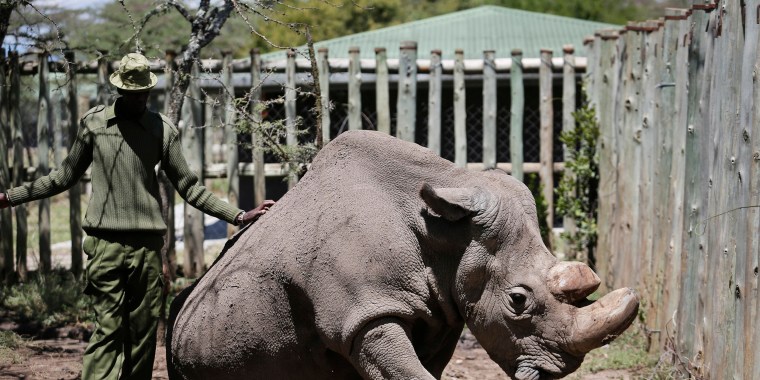By MADDIE CROCENZI and ED MAHON, York Daily Record
YORK, Pa. (AP) — In the 1990s, John Wolfe lost the right to carry a gun.
But Wolfe bought hunting licenses for many years without running into a problem.
Wolfe used a shotgun that he bought when he was about 18 to shoot a nearly 11-inch turkey.
Then one December morning in 2014, Wolfe decided to go hunting before work. He got caught by game wardens. A judge found him guilty of illegal gun possession in 2016. He now faces two-and-a-half to five years in state prison.
Wolfe’s case points to a loophole in Pennsylvania‘s gun laws. Each year, hundreds of thousands of people buy hunting licenses. That allows them to hunt deer, turkey and other animals in the woods while carrying a gun.
But under state law, people don’t need to pass any type of background check to confirm it’s legal for them to possess a gun in order to get a hunting license. There’s also no background check for a Sportsman’s Firearm Permit, which allows people to carry a handgun for hunting purposes.
This can put game wardens in dangerous situations.
In 2010, Christopher Johnson was suspected of illegally shooting a deer on a rural road near Gettysburg. David Grove, a game warden, stopped him. Johnson was a convicted felon, so he wasn’t allowed to possess a gun. He had a valid hunting license, according to Pennsylvania Game Commission Assistant Counsel Jason Raup.
Johnson told a passenger in his car he wasn’t going back to jail, the passenger testified later.
Johnson opened fire and shot Grove. Grove died instantly. Johnson was convicted and sentenced to the death penalty, which was upheld by the U.S. Supreme Court in 2015.
The York Daily Record/Sunday News reviewed nearly four years of cases in which someone who was banned from possessing a gun was charged with illegal firearm possession in the York County Court of Common Pleas.
Of those more than 400 cases, four were related to hunting. In two of those cases, a person was caught while hunting. In two others, men were arrested for DUI and told police they had been hunting earlier.
First-time hunters and trappers must pass a hunting education course before being able to purchase a Pennsylvania hunting license. Sean Heisey, York Daily Record
Under federal law, all felonies and some misdemeanor convictions make it illegal for people to possess a gun. But specific hunting license information in Pennsylvania, such as the names of those with licenses, is not public under the Game and Wildlife Code. So it’s not possible to check the records on all of the people granted hunting licenses to see if they have criminal convictions that make it illegal for them to possess guns.
In states where license information is public, reporters have found large numbers of convicted felons hunting illegally.
In 2006, an Associated Press investigation showed that at least 660 felons on parole or probation received tags that allowed them to hunt with rifles or shotguns in Montana. The Arkansas Democrat-Gazette found about 4,800 felons bought hunting licenses during the 2007-08 hunting season. At least 859 hunted with a muzzleloader or a modern gun.
Few, if any, states verify that someone is allowed to possess a gun when they issue a hunting license.
But some states have stricter requirements than Pennsylvania for general gun and ammunition possession.
Connecticut, Illinois, Massachusetts and New Jersey require a firearms license to purchase or possess ammunition, according to the Giffords Law Center to Prevent Gun Violence. Illinois and Massachusetts require a license to own a firearm.
Massachusetts doesn’t have a background check system for hunting licenses. But Jim Wallace, executive director of the Gun Owners Action League in Massachusetts, said he thinks the strict gun laws in the state have kept people with criminal convictions from hunting.
In fact, he thinks it’s kept too many people from hunting. Wallace said the ban winds up covering people who made foolish mistakes decades ago but aren’t dangerous.
Some states warn people they can’t hunt if they are banned from possessing a gun.
In Maine, there is no check to confirm people can possess a gun when they apply for a hunting license, but they have to disclose whether they are a convicted felon. If they lie, they could face charges of unsworn falsification and fraudulently obtaining a license.
In Rhode Island, the hunting license application says people convicted of certain crimes, including sexual assault and felony drug delivery, can’t buy or possess a hunting license. If they do, they could be punished with a $500 fine and up to 90 days in jail.
Raup said this warning isn’t included on Pennsylvania hunting license applications. He wasn’t aware of any instructions — whether on the PGC’s website or included in printed materials — that says being ineligible to possess a firearm prevents you from hunting with one.
Details from a 2011 Pennsylvania Game Commission operation showed felons continued to hunt with firearms. Operation Talon, a nighttime operation to stop poaching, was first held during the weekends of Oct. 21, 28 and Nov. 5, according to the Pocono Record. During those three weekends, two felons were caught possessing firearms. In 2017, no felons possessing firearms were caught during Operation Talon.
Raup said it’s “a growing problem” that’s difficult for the agency to quantify.
“I don’t know that statistically we have a good handle on that because we only come across it when we come across it,” Raup said.
The process of identifying and prosecuting a convicted felon hunting with a firearm is complicated.
“There is no one-size-fits-all response that we take,” Raup said.
Full-time game wardens have the legal authority to charge someone for any crime, including specific wildlife laws. Wardens can stop anyone and do a background check, even if they don’t see an immediate violation. However, Raup said most stops begin with some kind of violation.
Others self-identify as convicted felons who know they weren’t supposed to be hunting. And sometimes, officers just have a “gut hunch” that something is off, according to Raup.
In Wolfe’s case, he was caught hunting by a game warden who already knew he wasn’t allowed to possess a gun. Raup said this happens but is somewhat infrequent.
A game warden will put a felon under arrest for hunting with a firearm. However, that doesn’t mean the individual will lose his or her license. Because there’s no background check, the individual could apply and hunt again the following year if he or she hasn’t committed any game and wildlife violations.
The agency has no legal authority to do background checks at the beginning of a hunting license sale, according to Raup. As a result, criminal history doesn’t stop the sale of a hunting license. Only Game and Wildlife Code violations can result in license suspension or revocation.
“A lot of folks kind of look at that and see that as ‘Holy smokes, that’s kind of bizarre;’ you’re selling licenses to persons in large respect who can’t even possess a firearm,” Raup said.
People caught hunting when their license is revoked for violating a wildlife law face a $1,000-$1,500 fine and can also face up to 90 days in prison. Hunting with an illegally possessed firearm can lead to years in prison.
“If you get this wrong, it’s not just a citation, it’s a felony,” Raup said. “You’re arrested. You’re put in jail. I do think there is an important responsibility we have as a state to ensure we are fairly applying the law.”
The work game wardens do can be dangerous. That’s why state Rep. Keith Gillespie, R-Hellam Township, proposed a bill in January 2017 to define game wardens as “enforcement officers” – and give them the same benefits as other officers.
Gillespie, chairman of the state House Game & Fisheries Committee, said game wardens are often by themselves in remote areas of the state. He compared felons hunting with firearms to those who continue to drive after getting a DUI – people who “don’t get the message.”
“I wish we could legislate good scruples, morals and ethics,” Gillespie said. “Unfortunately, we can’t.”
Gillespie said he liked the idea of background checks to get hunting licenses and wanted to explore it with the Game Commission.
But Raup sees potential problems with that idea. Convicted felons can’t hunt with a firearm, but they can legally hunt or trap with air guns, archery equipment and more. Raup said denying hunting licenses to these people would also deny them access to legal hunting activities.
“A background check at the time of application is kind of a spooky thing,” he said. “I don’t know if our society wants us doing that.”
Steve Mohr doesn’t want that either. He is a 67-year-old hunter, the vice president of Unified Sportsmen of Pennsylvania and a former state game commissioner.
“We already have so many ways of checking it now, and people fall through the cracks,” said Mohr, who lives in Lancaster County, near the Susquehanna River. “So why waste the time?”
Mohr thinks that a background check system would make things harder on people who don’t break the law. They would end up having to wait longer for hunting licenses and pay more for the licenses, he said.
Shira Goodman, who recently took a temporary leave of absence as executive director of CeaseFirePA, said there are bigger gaps in gun laws than the hunting one. In Pennsylvania, you can buy a rifle from a friend or neighbor without a background check. If you lose a gun or it’s stolen from you, you don’t have to report that to police.
But she said the gaps add up and make the problem worse.
Paul Orr, an attorney who represented Wolfe, is a hunter. He thinks doing background checks on everyone seeking a hunting license might not be a good idea. But he thinks that at the very least license applications should warn people that previous convictions could make it illegal for them to possess a gun.
“It would at least put the person on notice,” Orr said.
Raup thinks part of the problem is confusing state firearms laws, which create a dilemma for law enforcement officers. He thinks the court system could provide better information and education so people don’t inadvertently commit felonies.
“I think we could do better,” he said.
Wolfe and his attorneys have argued that he didn’t know he wasn’t allowed to possess a gun.
“He’s not an attorney. He’s not a judge. He’s just a country boy from York who likes to hunt,” Orr said at Wolfe’s trial.
Meanwhile, prosecutor Susan Emmons described Wolfe — someone with multiple felony and other convictions on his record — as the very type of person lawmakers want to keep guns away from.
His case gives a view of how these illegal gun possession cases play out.
Wolfe, 42, has been convicted of several crimes that make it illegal for him to possess a gun. In the 1990s, he was convicted of burglary and involuntary deviate sexual intercourse. In 2009, he was convicted on a charge of possession with intent to deliver marijuana.
But, over the years, he had access to guns, he testified during his trial.
In 2013, Wolfe met with a game warden after the officer got a report of Wolfe allegedly using a muzzle-loading firearm to shoot a large buck, even though it wasn’t buck season.
That game warden, Kyle Jury, and Wolfe have described the conversation that took place between them differently.
Jury testified that when he spoke to Wolfe, Wolfe didn’t have a muzzleloader with him. Wolfe wasn’t charged with a crime either. But Jury said he still warned him that he wasn’t allowed to possess a gun, even a muzzleloader.
Wolfe said the conversation was more vague.
For the 2014-15 hunting season, Wolfe bought at least one hunting license from Walmart, he testified.
In December 2014, Wolfe went hunting before work. It was a dreary morning, he said.
Jury was on patrol in Newberry Township a little after 7 a.m. It was early during rifle deer season. It’s a busy time of year, and Jury was used to doing what are known as field checks. He’d make sure hunters had their licenses. He’d see that they wore enough fluorescent orange.
Then Jury spotted someone hunting close to a property where an owner had previously expressed concerns about hunters being too close. When Jury and a fellow officer approached, Wolfe was in a tree stand, about 15 feet in the air and wearing orange.
Wolfe had a firearm with him — a shotgun with a rifle barrel for hunting deer, Jury testified.
When Wolfe took off his hat, Jury recognized him. Wolfe wasn’t carrying a hunting license with him, which is a violation.
The wardens confirmed Wolfe wasn’t allowed to possess a gun and arrested him.
Wolfe fought the illegal gun possession charge. At an April 2016 trial, he testified that he thought the ban on him possessing a gun ended when his probation did. The shotgun that game wardens found with Wolfe is one he bought when he was about 18, he testified. Whenever he was on probation and not allowed to possess a gun, he would give that shotgun and any other similar guns to his mother, he testified.
His attorney argued that probation office forms were confusing. The prosecutor and York County Court of Common Pleas Judge Michael Bortner didn’t buy that argument.
Bortner found Wolfe guilty of illegally possessing a gun. He later defended the decision, saying, “The evidence showed he had every reason to know he was not allowed to have guns.”
Emmons, the prosecutor, asked for five years to 10 years in state prison, saying the sentencing guidelines called for that. Bortner said that amount of time was excessive and instead sentenced him to two-and-a-half to five years in state prison.
Wolfe appealed, but the Pennsylvania Superior Court agreed with Bortner. Then, in October 2017, he appealed to the Pennsylvania Supreme Court.
While his case was under appeal, Wolfe remained free on supervised bail.
One of the conditions of bail is that he can’t possess a gun. That might seem obvious.
But Bortner made that extra clear back in June 2016 at Wolfe’s sentencing hearing.
“As difficult as it may be for you and your lifestyle, you need to stay away from firearms,” Bortner told Wolfe.
The case was under appeal for more than a year. But on Feb. 21, 2018, the Pennsylvania Supreme Court denied Wolfe’s request for an appeal. The day of the decision, Wolfe’s attorney for the appeal, Eric Winter, said he and Wolfe would have to discuss options.
Information from: York Daily Record, http://www.ydr.com
Copyright 2018 The Associated Press.






